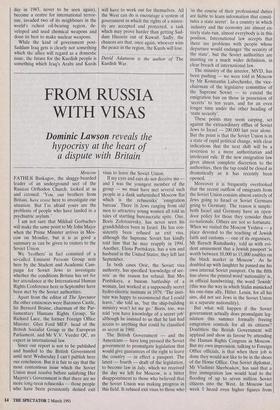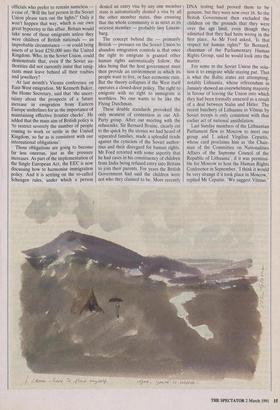FROM RUSSIA WITH VISAS
Dominic Lawson reveals the
hypocrisy at the heart of a dispute with Britain
Moscow FATHER Baskagov, the shaggy-bearded leader of an underground sect of the Russian Orthodox Church, looked at us and intoned: 'You, our brothers from Britain, have come here to investigate our situation. But I'm afraid yours are the problems of people who have landed in a psychiatric asylum.' I am not sure that Mikhail Gorbachev will make the same point to Mr John Major when the Prime Minister arrives in Mos- cow on Monday, but it is as good a summary as can be given to visitors to the Soviet Union.
We 'brothers' in fact consisted of a so-called Eminent Persons Group sent here by the Student and Academic Cam- paign for Soviet Jews to investigate whether the conditions Britain has set for her attendance at the International Human Rights Conference here in September have been met by the Soviet authorities.
Apart from the editor of The Spectator the other eminences were Baroness Castle, Sir Bernard Braine, chairman of the Par- liamentary Humans Rights Group, Sir Richard Luce, the former Foreign Office Minister, Glyn Ford MEP, head of the British Socialist Group in the European Parliament, and Mr V.V. Veeder QC, an expert in international law.
Since our report is not to be published and handed to the British Government until next Wednesday I can't publish here our conclusion. But it is fair to say that the most contentious issue which the Soviet Union must resolve before satisfying Her Majesty's Government is that there are no more long-teen refuseniks — those people who have been persistently denied exit visas to leave the Soviet Union.
If my eyes and ears do not deceive me and I was the youngest member of the group — we must have met several such people in a dank unfurnished Moscow flat which is the refuseniks' emigration bureau'. There 16 Jews ranging from old men to attractive young women all told us tales of startling bureaucratic spite. One, Boris Zolotorevsky, has never seen his grandchildren born in Israel. He has con- sistently been refused an exit visa, although the Supreme Soviet has kindly told him that he may reapply in 1994. Another, Elena Poritskaya, has a son and husband in the United States; they left last September.
In both cases Ovir, the Soviet visa authority, has specified 'knowledge of sec- rets' as the reason for refusal. But Mrs Poritskaya, a buxom battleship of a woman, last worked at a supposedly secret hydro-electric institute in 1979. 'The insti- tute was happy to recommend that I could leave,' she told us, tut the ship-building ministry won't let me go.' Boris, too, was told 'you have knowledge of a secret job' although he insisted to us that he last had access to anything that could be classified as secret in 1980.
The British Government — and the Americans — have long pressed the Soviet government to promulgate legislation that would give guarantees of the right to leave the country — in effect a passport. The latest — fourth — draft of the legislation, to become law in July, which we received the day we left for Moscow, is a bitter disappointment to those who believed that the Soviet Union was making progress in this field. It refused exit visas to those who 'in the course of their professional duties are liable to learn information that consti- tutes a state secret'. In a country in which industry and the economy are almost en- tirely state-run, almost everybody is in this position. International law accepts that there are problems with people whose departure would endanger 'the security of the state', but the Soviet authorities are insisting on a much wider definition, in clear breach of international law.
The ministry of the interior, MVD, has been pushing — we were told in Moscow by Mr Konstantin Lubechenko, the vice- chairman of the legislative committee of the Supreme Soviet — to extend the emigration ban on those in possession of `secrets' to ten years, and for an even longer time under the other heading of `state security'.
These points may seem carping, set against the extraordinary efflux of Soviet Jews to Israel — 200,000 last year alone. But the point is that the Soviet Union is in a state of rapid political change, with clear indications that the next shift will be a reversion to a more authoritarian and intolerant rule. if the new emigration law gives almost complete discretion to the authorities, then the tap could be closed as dramatically as it has recently been opened.
Moreover it is frequently overlooked that the recent outflow of emigrants from the Soviet Union consists almost entirely of Jews going to Israel or Soviet Germans going to Germany. The reason is simple: both Israel and Germany have an open- door policy for those they consider their co-nationals. Others are not so fortunate. When we visited the Moscow Yeshiva — a place devoted to the teaching of Jewish faith and customs — one of its organisers, Mr Baruch Rumshusky, told us with evi- dent amusement that a Jewish passport 'is worth between 10,000 to 15,000 roubles on the black market in Moscow'. As he doubled up with laughter he passed me his own internal Soviet passport. On the fifth line above the printed word 'nationality' is, in official handwriting, the word 'Jewish' (this was the way in which Stalin mimicked his one-time ally, Hitler. Lenin, for all his sins, did not see Jews in the Soviet Union as a separate nationality).
But what will happen if the Soviet government actually does promulgate leg- islation this summer formally freeing emigration controls for all its citizens? Doubtless the British Government will applaud and show its favour by attending the Human Rights Congress in Moscow. But my own impression, talking to Foreign Office officials, is that when their job is done they would not like to be in the shoes of the Home Office. One Soviet diplomat, Mr Vladimir Sherboakov, has said that a free immigration law would lead to the flooding of up to seven million Soviet citizens into the West. In Moscow last week I heard even higher figures from officials who prefer to remain nameless a case of, `Will the last person in the Soviet Union please turn out the lights?' Only it won't happen that way, which is our own great hypocrisy in this affair. Britain would take none of those emigrants unless they were children of British nationals — an improbable circumstance — or could bring assets of at least £250,000 into the United Kingdom. Who, in the Soviet Union, could demonstrate that, even if the Soviet au- thorities did not currently insist that emig- rants must leave behind all their roubles and jewellery?
At last month's Vienna conference on East-West emigration, Mr Kenneth Baker, the Home Secretary, said that 'the uncer- tainty about the prospects of a future increase in emigration from Eastern Europe underlines for us the importance of maintaining effective frontier checks'. He added that the main aim of British policy is 'to restrict severely the number of people coming to work or settle in the United Kingdom, so far as is consistent with our international obligations'. Those obligations are going to become far less onerous, just as the pressure increases. As part of the implementation of the Single European Act, the EEC is now discussing how to harmonise immigration policy. And it is settling on the so-called Schengen rules, under which a person denied an entry visa by any one member state is automatically denied a visa by all the other member states, thus ensuring that the whole community is as strict as its strictest member — probably tiny Luxem- burg.
The concept behind the — primarily British — pressure on the Soviet Union to abandon emigration controls is that once the right to emigrate is granted other human rights automatically follow; the idea being that the host government must then provide an environment in which its people want to live, or face economic ruin. But the theory collapses if the West itself operates a closed-door policy. The right to emigrate with no right to immigrate is worthless. No one wants to be like the Flying Dutchman.
These double standards provoked the only moment of contention in our All- Party group. After our meeting with the refuseniks, Sir Bernard Braine, clearly cut to the quick by the stories we had heard of separated families, made a splendid tirade against the cynicism of the Soviet author- ities and their disregard for human rights. Mr Ford retorted with some asperity that he had cases in his constituency of children from India being refused entry into Britain to join their parents. For years the British Government had said the children were not who they claimed to be. More recently DNA testing had proved them to be genuine, but they were now over 16. So the British Government then excluded the children on the grounds that they were over the age limit, even though they admitted that they had been wrong in the first place. As Mr Ford asked, 'Is that respect for human rights?' Sir Bernard, chairman of the Parliamentary Human Rights Group, said he would look into the matter.
For some in the Soviet Union the solu- tion is to emigrate while staying put. That is what the Baltic states are attempting, notably Lithuania, whose referendum in January showed an overwhelming majority in favour of leaving the Union into which they had been formally annexed as a result of a deal between Stalin and Hitler. The recent butchery of Lithuania in Vilnius by Soviet troops is only consistent with that earlier act of national annihilation.
Last Sunday members of the Lithuanian Parliament flew to Moscow to meet our group and I asked Virgilius Cepaitis, whose card proclaims him as 'the Chair- man of the Committee on Nationalities Affairs of the Supreme Council of the Republic of Lithuania', if it was permissi- ble for Moscow to host the Human Rights Conference in September. 'I think it would be very strange if it took place in Moscow,' replied Mr Cepaitis. 'We suggest Vilnius.'



















































 Previous page
Previous page